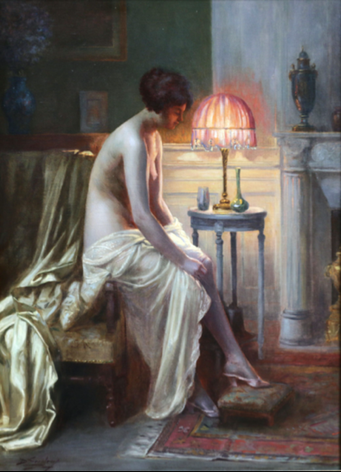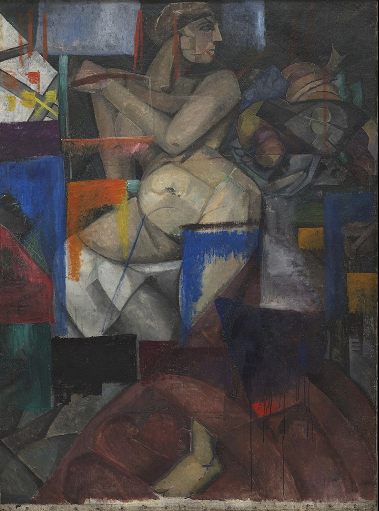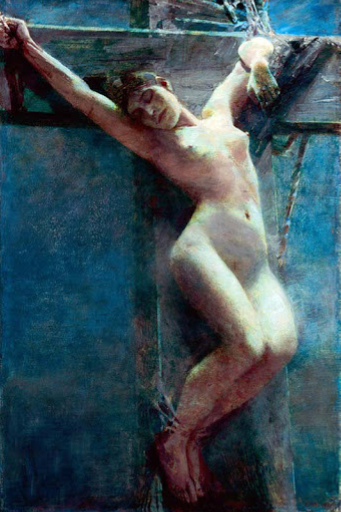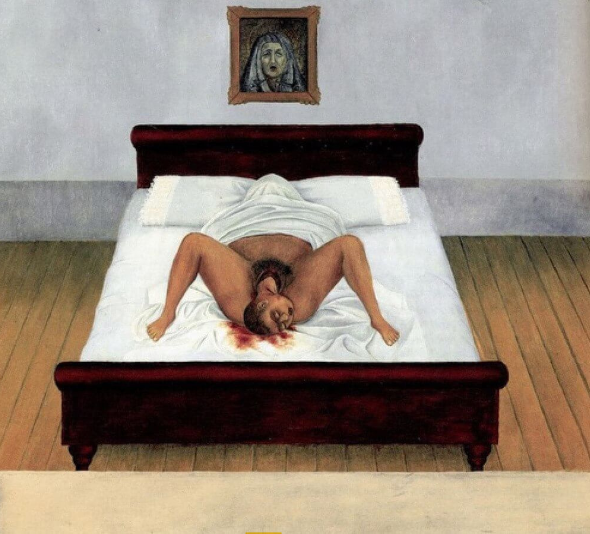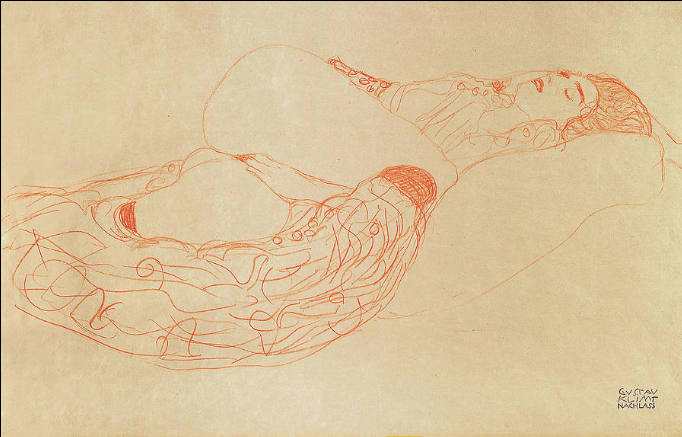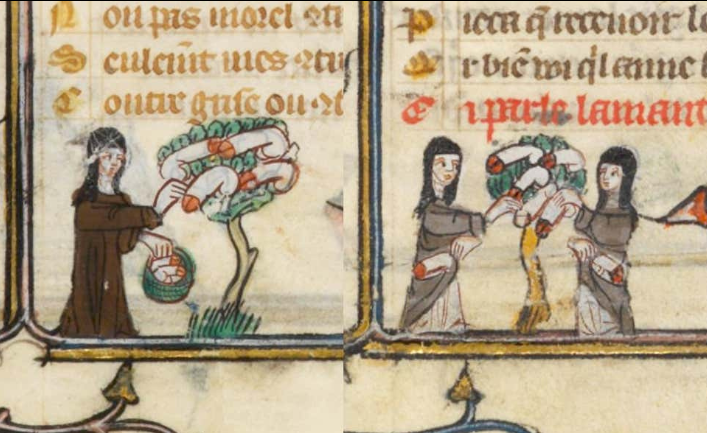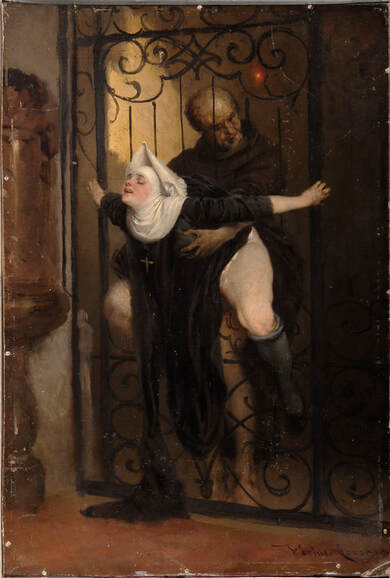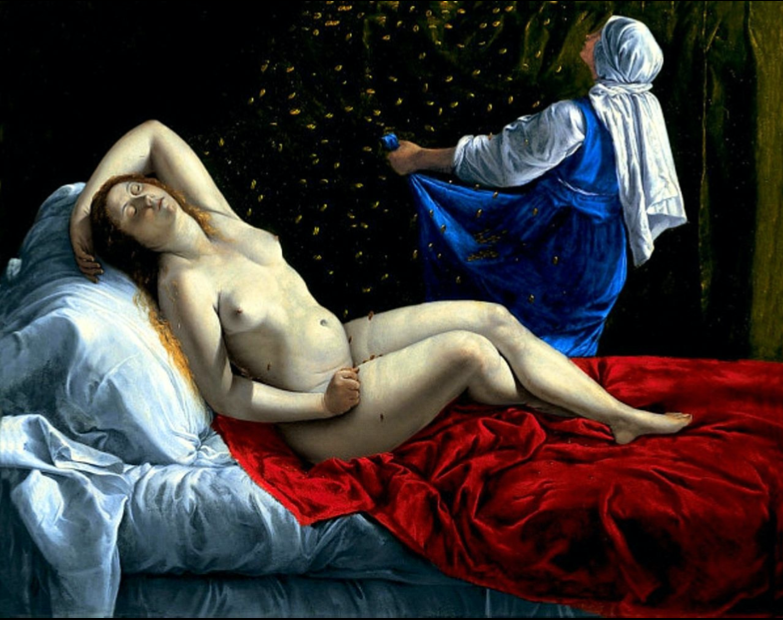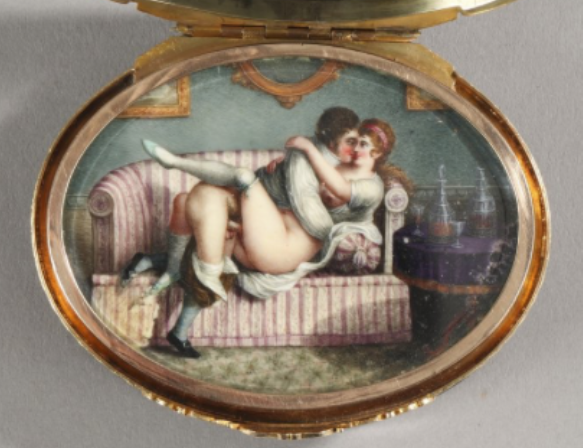|
Obligatory Warning: This post contains discussion about human sexuality, erotic literature, and visual art on these themes. Some readers and viewers may find them disturbing. Please consider this before you scroll down. By scrolling down, you confirm that you are 18 or over. Writing about sex is not easy. It might not be hard to throw down a bunch of filthy adjectives and print them out, but getting to the heart of the matter, the truth of it all, is a different matter. It's difficult to really get naked and tell the truth- we are vulnerable when writing about our most intimate experiences. Sex is beautiful and terrible, funny and forgettable, disappointing and surprising, painful and healing, powerful and victimizing. Sex is a weapon, and a bond. It is holy, and it is evil. It is magical and banal. We are all at turns embarrassed by much ado about nothing, by the scandalous places our desire takes us. And we have all glimpsed that exalted place, where we experienced untold pleasure, union, love, where we finally took something for ourselves, or finally found ourselves giving when we thought we were empty. We have used sex selfishly and we have given ourselves generously. We have landed in nightmares, fairy tales, and real life with a mortgage, diaper bills, and a dog. To those who bravely entered our ekphrastic sex contest- thank you for your courage. If you think writing about sex is easy, take a look at sex in literature, sex in cinema, sex in music. It's an incredibly commonplace subject, and it is almost always terrible. Henry Miller's infamous Tropic books come to mind. While countless heralded these as brave and beautiful tomes of the unspeakable, I was not moved by the, ahem, wooden language. Elsewhere, Miller is a very deft writer with many nuanced, if frank, works. Here, he handles women awkwardly to say the least, with his pen. You might recall the travesty, Sex, by Madonna, an artist with every conceivable consultant, artist, and budget at her fingertips. In the 90s she decided to give us a gift, herself, naked, with erotic writings and nude photography, a kind of narcissistic self-portrait. I confess I was a big fan and young feminist and eager to get my hands on this new style of woman-centered, sex-positive art. The entire thing was hideous. The writing could not have been less exciting or more idiotic. This from a woman who fears nothing and had no limitations of talent and assistance available to her. She could not write a single honest, sensual sentence on the subject. To read good sex, read the poetry of Sharon Olds. Married sex, practical and pensive odes to various body parts, birth, aging, and some heady and ribald thrills, all woven around real characters and the rest of the stuff of real life. Of course, the queen of the literary erotic is Alexis Rhone Fancher. Fancher is known for her stunning poetry and small stories on two prominent themes: sex, and death. She writes about both with candid frankness, raw honesty, complexity, and a whole range of honest emotions. She writes about the characters and their complications, not just their body parts. Her work is shocking, but it is not about shock value. It's a shot to the heart and a good, long, honest look in the mirror. I have all of Alexis's books: How I Lost My Virginity to Michael Cohen; Enter Here; Erotic; Junkie Wife; The Dead Kid Poems; and State of Grace: The Joshua Elegies. I admire how a woman can write without flinching about the most terrible loss. That same openness, that same willingness to experience all of life's emotions, from the beautiful to the devastating to the untidy, permeates all of her poetry about sex, too, from power to pleasure to pain. We were absolutely thrilled when Alexis agreed to be our guest judge for the Ekphrastic Sex contest. I could think of no one more suited to the role, and was on cloud nine when she accepted. We had a zoom workshop on Writing Sex as well. It was an absolute pleasure to work with Alexis. She helped choose the finalists here, and she has chosen the winning story and poem from these finalists as well, to be announced soon. Alexis read all entries without names or bios of authors. THANK YOU ALEXIS XOXOXOXOXOX Congratulations to all of you! The Finalists (in no particular order): Flash Fiction: The Care and Feeding of Your Penis Tree, by Margo Stutts Toombs Wages of Sin, by Bernardo Villela The Neighbours, by Alan Bern Poetry: Frida Gives Birth to Herself, by Mary McCarthy The Smallest Events Cause Trembling, by Martina Reisz Newberry For Another, by Alun Robert In the Room Where We Live Forever, by Sherry Abaldo Hurts, by F.F. Teague Framing the Question, by Elsa Fischer The Sheet, by Tricia Marcella Cimera Unformed, by Judith Duncan Zeus and the Honey, by Suzy Aspell For Another another day another beast another scar another bruise another kink another position another crevice another device another grey hair another crows foot another tear another vomit another gin another spiff another douche another few Francs another night another nightmare another beating another day closer another life another location another existence another vocation Alun Robert Alun Robert is a prolific creator of lyrical free verse. He has achieved success in poetry competitions across the British Isles, Europe and North America. His work has been published by many literary magazines, anthologies and webzines in the UK, Ireland, Belgium, Italy, India, South Africa, Kenya, USA and Canada. Since 2018, he has been part of The Ekphrastic Review community particularly enjoying the biweekly challenges. He is a member of the Federation of Writers Scotland for whom he was a Featured Writer in 2019. ** The Smallest Events Cause Trembling Trysts take place in the day, blinds drawn against the sun or wide open to let in November’s weak excuses for light. The reason is this: Stealing time in the evening is too hard. The complications of being away from spouse and children when it is dark are too difficult to maneuver. Truth comes undone when met with the secrets of a room rife with whispers. You can almost say that your anxious breathing floats on an atmosphere of your best intentions and it may be that those body-to-body songs really are the best things you’ve ever done. The smallest events cause trembling: an exhaled breath, a flickering eyelash, a long airy “yes,” a knowing touch at the base of the spine– his or yours–it doesn’t matter which. At home, at 3 a.m.,you interrogate yourself– ask the questions that, one day, the spouse or the children or the siblings or the friends will ask. To all you’ll say: Life was too stern, too frightful. I looked for God but found this ‘other,’ who spoke to me in the voice of a merman and caused a tide in me to rise as high as it never had before. What I felt passed for miraculous and I was willing to die rather than let it go. When it’s over, you crave a desperate change of scenery, a haircut, a cold glass of water. The 3 a.m. interrogations continue. You promise yourself to be truthful, to give it all you’ve got. Then you can sleep. Martina Reisz Newberry Martina Reisz Newberry is a passionate lover of Los Angeles, she currently lives there with her husband. Newberry’s most recent book is BLUES FOR FRENCH ROAST WITH CHICORY, (Deerbrook Editions). She is also the author of NEVER COMPLETELY AWAKE, (May 2017, Deerbrook Editions). WHERE IT GOES (Deerbrook Editions). LEARNING BY ROTE (Deerbrook Editions) and RUNNING LIKE A WOMAN WITH HER HAIR ON FIRE: Collected Poems (Red Hen Press). She has been widely published in the U.S. and abroad. She has been awarded residencies at Yaddo Colony for the Arts, Djerassi Colony for the Arts, Anderson Center for Disciplinary Arts. Framing the Question In Philadelphia you visit the museums where nudes revel in their flesh and bone. You’re jealous of Cézanne’s bathers, Renoir’s women, luxuriant, their skin so luminous. Framed in the mirror, you call yourself Interior with Old Nude Is this it? Look at those joyless breasts, the webs of veins, the profile needing surgery. You seek refuge with Rembrandt whose Old Women feed cats, pluck geese, cut their nails. Some even weigh gold. Elsa Fischer Elsa Fischer comes from the Netherlands, studied Art History at Carleton University, Ottawa, lived and jobbed on four continents and currently lives in Switzerland’s capital where she is a “yelpie” rather than a “woopie”. She tries hard to convey her love of poetry to the natives and is a member of a workshop for expats. She has two pamphlets in the UK and poems published in magazines and anthologies. She endeavours to age with grace. Hurts Once a priest told me, In your suffering Felicity you are as Christ on the Cross and I know how I shine but it hurts up here and I want to come down. F.F. Teague F.F. Teague (Fliss) is a copyeditor/copywriter by day and a poet/composer come nightfall. She lives in Pittville, a suburb of Cheltenham (UK). Her poetry features regularly in the Spotlight of The HyperTexts; she has also been published by The Mighty, Snakeskin, The Ekphrastic Review, and a local Morris dancing group. Other interests include art, film, and photography. https://twitter.com/agentalekblack The Sheet The white cotton sheet is (clean canvas) bought in the marketplace by the flower and bread stalls. Your mother makes the bed, prays to our Mary framed on the wall. She and your father have desultory sex on the new sheet until it’s wrinkled, body wet. It’s washed, it waits. Finally you come. Your face pushes out of your mother, iron through bone. You close your eyes on (first canvas) the fuchsia blood sheet. Mary looks down, intones Fucked, Frida before you begin. Tricia Marcella Cimera Tricia Marcella Cimera is a widely published poet, editor of the Fox Poetry Box, and longtime Ekphrastic contributor. She was a guest judge for our Birdwatching contest. ** Unformed You steal words from my mouth while still soft unformed vowels, before palatable. Tasteless without sound or meaning. Intent unknown. What would they say–those sibilant syllables I throw against your window in broad day light. Truth speaking, I claim. Truth telling. Unborn words on my tongue, defenseless, unadorned, unblessed by punctuation. Sounds you swallow whole, and form to words. Like that child who spilled unwanted onto our bed sheets. Unformed, soft. A blemish you say, no harm, no foul. Judith Duncan Retired from University teaching and software development in Chicago, Judith now tends chickens and a small orchard on the Olympia Peninsula, WA. She claims that a walk in the hilly forest solves most of her difficulties. Judith writes to discover herself– who she is and what she thinks about difficult issues. Her poems and prose have been published in local anthologies and journals. Several poems are in the more widely distributed Cirque, A Literary Journal for the North Pacific Rim. ** Frida Gives Birth to Herself Broken, patched, confined, braced, casted, a cage of pain, The body you were born with was too much a prison for your wild heart... so you labour, your face covered under a white sheet as if to hide from sight or judgement, with no help, no witness except the image of a shocked Madonna hung above the bed, you gather your strength alone, forcing your own rebirth from the broken body of desire. You come in one bloody push from the damaged womb defiant and alive full grown, whole, into a world you make your own with passion enough to pull the stars down to lie in drifts of diamond at your feet and leave the sky empty... a blind canvas for you to fill with portrait after portrait of yourself surrounded by the landscape of dreams where, regal as any queen you meet your lovers with a crown of flowers on your head, and around your neck a chain of thorn. Mary McCarthy Mary McCarthy is a retired Registered Nurse with a life long love of art and writing. She finds ekphrastic work particularly interesting and inspiring for that very reason—a chance to indulge and explore in her favorite arts. Her work has appeared in many anthologies and Journals, most lately in The Plague Papers, edited by Robbi Nester, The Ekphrastic World, edited by Lorette C. Luzajic, and the latest issue of Earth’s Daughters. Her digital chapbook, Things I Was Told Not to Think About is available as a free download from Praxis magazine. In the Room Where We Live Forever It was not only in the room at the hotel on Central Park where you’d call from the lobby after a long flight, almost angrily demanding What room are you in, the fly of your faded jeans bursting, breath scotch smoke. It was not only in the motel on the ocean with the Peeping Tom you spotted as I rode you, rolled you like the high tide waves. It was not only in your office, or a Hertz car with my head in your lap dappled with gold sun speeding down Monterey. It was out in Rumi’s field. It was under Byron’s darkling stars. It was us playing Prometheus with Marlboro Lights. We smoked ‘em ‘cause we had ‘em. Days trundled by with bills and deadlines, taxes, birthdays and here I was like Pele – Swallowing the sun each night, giving birth to it each morning. You never asked how I’d feel about you making me pregnant. We had our rules: no kissing, no emotional attachment. One time I said I wanted to sleep-not-sleep next to you all night, taboo but I guess I figured by then I had trampled so many taboos. You looked like I had slapped you, or run over your childhood dog. I still sleep the way I did then: legs akimbo, one leg hitched up so my knee is level with my chin. Once you called me luminous. You want to know if I ever think about you. I say no. Sherry Barker Abaldo Sherry Barker Abaldo's work has appeared in outlets such as The New York Times, Rattle, The History Channel, PBS, and Down East Magazine. Her poetry infuses her writing for the screen and vice versa. She holds degrees from Wellesley College and the University of Southern California. A two-time Dibner Fellow, she lives and writes on a pond in Maine. She is at work on a collection of poetry and a travel memoir, as well as developing a writing program for seniors in her community, many of whom are still experiencing isolation and loneliness from the pandemic. The Care and Feeding of Your Penis Tree Penis trees are fun to raise, and they provide the owner with a magical sense of power and purpose. They give the gardener a ready answer to the question, “Do you have the balls for that?” Some say the penis has a mind of its own. You can keep yours in line and happy with the proper treatment.
Keep your penis tree contented, and you will have an unusual plant for years to come. It is not that hard. Margo Stutts Toombs Margo Stutts Toombs enjoys writing, performing and filmmaking. She performs her monologues at Fringe Festivals, art galleries and anywhere food and beverages are served. Her poetry is in Untameable City - Mutabilis Press, the 2011 Texas Poetry Calendar, Love over 60: An Anthology of Women’s Poems, the 2021 Friendswood Library Ekphrastic Poetry Reading and Archway Gallery chap books. "Compassion at the Border" is a documentary poem written as part of a collaboration with artist donna e perkins (No Más Muerte) for an exhibit at the Houston Holocaust Museum. Her flash nonfiction piece, "Tommy," is in the inaugural issue of Equinox. Wages of Sin Brother Sebastian would have to lie to get Abbot Gregorios to speak with him. He did not take the breaking of commandments lightly, but he knew if he told Abbot Gregorios the real reason he wanted to see him it would be all too easy for him to issue a denial and refuse to come. Worse he might arrange for Sebastian’s expulsion from the brotherhood or worse refer him for excommunication. He knew that threat always loomed over him, monk or not. Sebastian decided in the end he could say he wanted to take confession. That would be the lie. He did not need to confess but Abbot Gregorios would believe he did. A week hence they met in the courtyard, amidst the olive tree-cast shade with the other monks lingering far from their table awaiting their return. One pretentious aspect of Gregorios’s character was that he liked to take confession wherever, it was not necessary to have it in the confessional. He did this as if to appear casual, not over-regimented, to show that he was close to God, that he could be trusted, but Sebastian could tell he liked to do it for show. Sebastian played into his vanity by asking if they could meet outdoors. “I want to give the Lord an unobstructed view as I confess my sins,” Sebastian said. Another lie. What he wanted was to have that wrought iron fence, the one that separated the St. Bartholomew’s monastery from its adjoining sister-convent St. Agatha’s. The Abbot could call him a liar but he would have to do so looking at that gate over Sebastian’s shoulder. An emblem of his hypocrisy in full view. Sebastian inhaled deeply, not because of the weight of sin he carried, but to steel himself to confront Abbot Gregorios. “Forgive me Father, for I have sinned. It has been a month since my last confession. In that month I have found myself at times to be envious of my fellow brothers.” “For what cause, my child?” This man calling him “my child,” his being referred to as “Brother” in sight of the Lord, made Sebastian sick. Nonetheless he continued with his confession. It was easy in part because there was truth to what he just said, not that he believed it a sin worthy of confessing. “Because of the responsibilities afforded to them that I am not.” “Such as?” “I’m a harvester equivalent to a mule. I’ve worked vineyards, I could make the eucharistic wine.” Brother Gregorios nodded. “And of you, Brother,” Sebastian added. “Envious of me, you mean?” “Yes.” “Why would that be?” “I’ve not been afforded the forgiveness you’ve been.” “What on earth…” Sebastian didn’t know if Gregorios meant to continue but he was not about to respond. He had planned to transition from his own sin to the Brother’s. Now it was necessary to power through. “In your eyes, and of those with nothing better to do in my natal city, I was granted great clemency after a mere kiss. I was not strung up or burned or killed. All I had to do was join the monastery to save my wretched soul. Yet you of all people had the gall to tell me I was lucky not to be castrated.” “You needn’t confess to—” It was near-impossible for Sebastian not to retort, but he knew continuing was imperative as Gregorios was so unused to being challenged that he did not know where this was going. “But you, Abbot, how many times have you met with Mother Superior Margareta through that gate behind my back and copulated like a stallion in heat?” The refutation Gregorios wanted to offer died in his throat, smothered by the lump that had grown there. His skin was so blanched it looked like old plaster fit to flake off a wall. “How often have you rutted?” Sebastian pressed on. “How often have you violated The Church’s trust and the Lord’s?” “Enough!” Gregorios shouted punctuating his command with a fist slammed into the wooden table at which they sat, drawing the attention of all in the courtyard. When all the onlookers realized they had come too close to eavesdropping on a sacred, private rite they looked away. Brother Gregorios now addressed Sebastian in a whisper: “What is it you want from me?” “I’m feeling generous, so I’m giving you two choices. First choice, confess your transgressions to the proper authorities and resign.” “Never!” he said. Not as loud as before, but close. Some looked over for a moment, but then snapped their heads away faster than they had before. “The second option is the one you’re taking then. Considering your feelings on my so-called mortal sin, you won’t like it.” “Just name it.” Sebastian informed Abbot Gregorios that since he was insistent on breaking his vow and unrepentant, living a hypocritical existence, then he would also. Sebastian would now get to do more than kiss that lovely young man he had been caught with. Abbot Gregorios would protect his secret and Sebastian would protect his, or else mundane consequences would befall them both, not to mention what the wages of their sins would be in His Heavenly Kingdom. Bernardo Villela Bernardo Villela has short fiction included in periodicals such as Coffin Bell Journal, The Dark Corner Zine, Constraint 280 and forthcoming in Rivet. He’s had stories included in anthologies such as 101 Proof Horror, A Monster Told Me Bedtime Stories, From the Yonder II, and forthcoming in Disturbed and 42 Stories among others. He has had poetry published by Entropy, Zoetic Press, and Bluepepper and others. Website: www.miller-villela.com Zeus and the Honey Reclining on a crumpled bed delectable Danae aches for another’s touch. Her hands cup her virgin breasts, pucker nipples and tug delight, her clitoris buds and a heavy sigh escapes her lips so full of longing a god hears. Exposed neck and soft cheeks a letter of lust even love. From outside tower walls through billowing curtained windows Zeus delivers himself as a shower of golden rain. Honey runs in all the right places, sweet stickiness slicks a river from source to open mouth and ‘Oh Yes’ rings a new refrain. Suzy Aspell Suzy Aspell lives and works in Bedfordshire and has been published by Spelt Magazine, Sledgehammer Lit, Wombwell Rainbow and The Ekphrastic Review. She was also long listed in The Ekphrastic Review 60 Women Artists Competition and was immensely proud. She is currently working on producing a pamphlet on feminine cultural history and is improving her poetry by attending workshops and branching out into writing short fiction. The Neighbours The neighbours knew. Somehow. From across the road. How? Without hearing. The neighbours didn’t like it: they knew these young unmarrieds were having long sex in the afternoon. Yes, the young couple had locked the screen door; still, sounds went through the tiny holes. But the couple played jazz music on the record player set to repeat. Miles. Loud. The cover. Slowly she’d come, hard, but with almost no wordsounds. Sighs. He asked her if the river. They lay on a bed below two large picture windows— they could see the greened hilltops, but not the river running below. And the jazz music did its job. Miles. And he’d come even harder, so he thought. Loud. And asking. Damp nap. Later the couple chose to go shopping for their next meals. He crossed the dirt road to ask the neighbours if they needed anything. No answer. Standing on their long redwood front porch, he looked at them through the glass sliding door opened just a crack. Alan Bern Alan Bern is a retired children’s librarian and cofounder with artist/printer Robert Woods of Lines & Faces, illustrated poetry broadside press/publisher, linesandfaces.com. His work has recently appeared in CERASUS, Mediterranean Poetry, Feral, and Mercurius. Alan’s awards for his writing include a medal from from SouthWest Writers and first runner-up for his poem “Boxae” in Raw Art Review’s first Mirabai Prize for Poetry, 2020. Alan is author of No no the saddest (Fithian Press), Waterwalking in Berkeley (Fithian Press), and greater distance (Lines & Faces). Alan performs with the dancer Lucinda Weaver as PACES and with musicians from Composing Together, http://composingtogether.org
0 Comments
Your comment will be posted after it is approved.
Leave a Reply. |
Challenges
|

